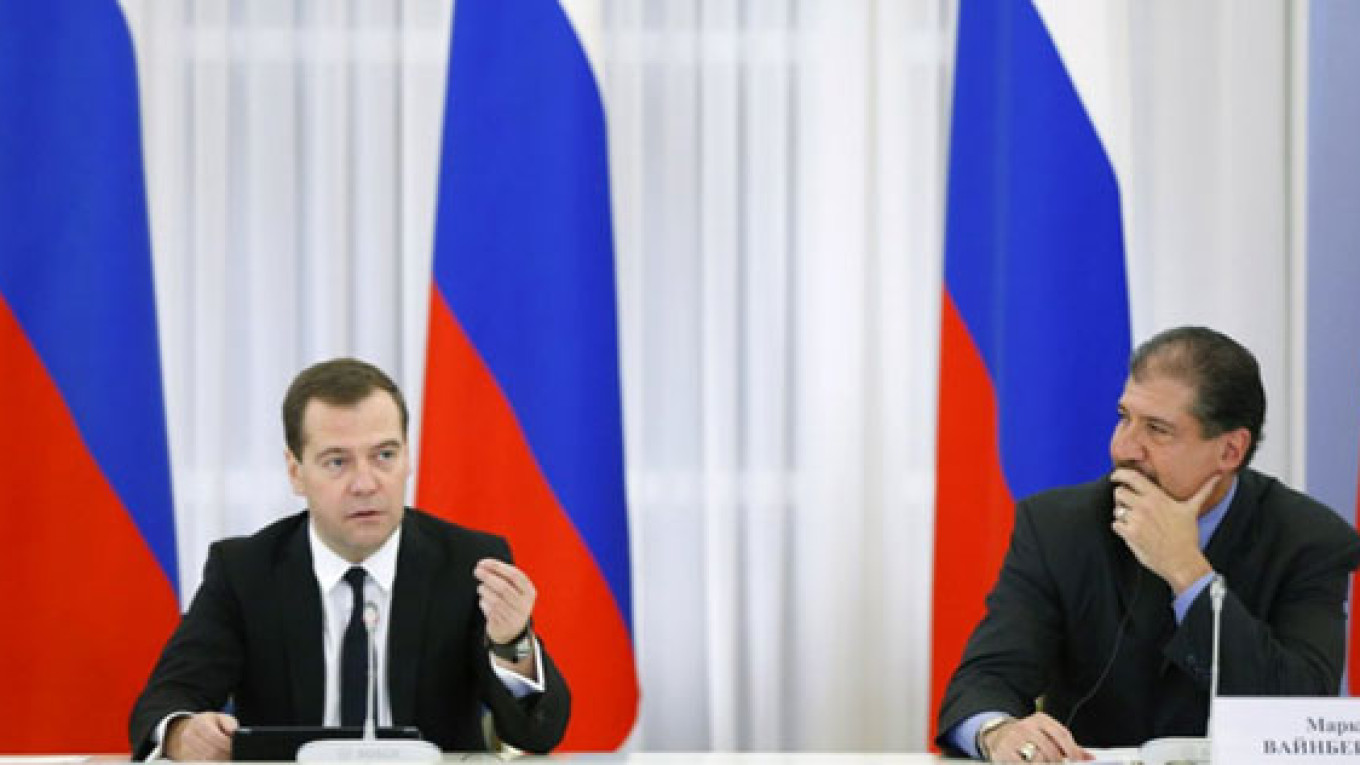Russia's economy has hit a plateau and will grow 2 percent at best in 2013, Prime Minister Dmitry Medvedev told the heads of 48 global companies during an annual meeting of the Foreign Investment Advisory Council at his residence outside of Moscow on Monday.
Medvedev said that although Russia has macroeconomic advantages, including a low unemployment rate, small government debt and large gold reserves, they are not enough for long-term development.
"We need to move forward and realize a whole complex of systematic measures aimed at forming a comfortable business environment, getting investment inflow, speeding up development and lessening all kinds of barriers," he added, according to an official transcript of the meeting.
The Foreign Investment Advisory Council, or FIAC, is made up of CEOs and board chairmen from large international corporations and banks that operate in Russia. The council members advise the government on promoting a favorable investment climate.
Economic growth slowed due to weak demand among consumers and investors, as well as low export amounts, Economic Development Minister Alexei Ulyukayev said Monday after the meeting, Reuters reported. His ministry, however, announced that foreign direct investment grew to $72 billion in the first three quarters of 2013, as compared to a total of $60 billion in 2012 and $56 billion in 2011.
"In some sense, global investors believe in the potential of Russia's economy maybe even more than local ones," Ulyukayev said, Interfax reported.
Medvedev told the foreign executives that the government has three priorities for improving Russia's business climate. The first involves helping to reduce businesses' operational costs, in part by freezing the tariffs of natural resource monopolies for a year and restricting them to inflation levels in 2015 and 2016.
Other measures focus on boosting the work of the country's multiple investment foundations and promoting public-private partnerships. The State Duma recently passed a bill on such partnerships in its first reading.
But the discussion was not completely positive. Foreign investors criticized the shortcomings of the local business environment. Among the key criticisms were excessive bureaucracy at customs control points, unfavorable conditions for small- and medium-size businesses, a lack of international relationships in the education system and harsh recycling and water treatment laws that are slated to be introduced next year.
Other officials, including Deputy Prime Minister Arkady Dvorkovich and Labor and Social Development Minister Maxim Topilin, were on hand to respond to the investors' feedback so that, as Medvedev said, he "would not have to take the punches for everybody."
Participants welcomed the willingness of authorities to enter into an open dialogue.
"We are witnessing that the Russian government is removing administrative barriers and is eager to make all business processes easier. We feel it right now," Paul Bulcke, CEO of food giant Nestle, told The Moscow Times. "Meanwhile there still exist several obstacles, such as a too high level of protectionism for domestic producers. We believe that this seriously harms the market and state of the economy in general."
Irene Rosenfeld, chief executive of food and beverage conglomerate Mondelez International, called FIAC a "proven and credible platform for dialogue," and said that the forum has not lost its clout since the change in its leadership. Chairing the meeting is the responsibility of the prime minister so most FIAC members have attended two sessions with Medvedev following several years of leadership by Vladimir Putin.
"FIAC was established in 1994. There have been several leadership changes in the Russian government since then," Rosenfeld said. "In spite of these changes, we all still benefit from the existence of such a forum that facilitates the relationship between businesses and authorities."
Contact the author at e.smirnova@imedia.ru
A Message from The Moscow Times:
Dear readers,
We are facing unprecedented challenges. Russia's Prosecutor General's Office has designated The Moscow Times as an "undesirable" organization, criminalizing our work and putting our staff at risk of prosecution. This follows our earlier unjust labeling as a "foreign agent."
These actions are direct attempts to silence independent journalism in Russia. The authorities claim our work "discredits the decisions of the Russian leadership." We see things differently: we strive to provide accurate, unbiased reporting on Russia.
We, the journalists of The Moscow Times, refuse to be silenced. But to continue our work, we need your help.
Your support, no matter how small, makes a world of difference. If you can, please support us monthly starting from just $2. It's quick to set up, and every contribution makes a significant impact.
By supporting The Moscow Times, you're defending open, independent journalism in the face of repression. Thank you for standing with us.
Remind me later.


